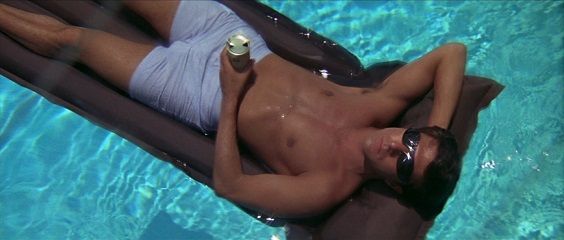It's very comfortable just to drift here.

The first time I saw The Graduate was half a lifetime ago, and I was right around Benjamin Braddock's age. Now I'm right around Mrs. Robinson's age, which gives me a different perspective on their affair, but I can't help still identifying with Benjamin's unease and uncertainty about the future. The difference, of course, is I don't have the luxury of spending my days lounging around my parents' swimming pool and my nights shacking up with a married woman while I avoid having to figure it out.
From its opening, in which Benjamin (Dustin Hoffman, ten years too old for the role but not looking it) descends into LAX with a deer-in-headlights look in his eyes, to the famous finale, which finds him and Elaine Robinson (Katharine Ross) sitting at the back of a bus, half-exhilarated and half-bewildered, The Graduate is perfectly attuned to the mindset of one (and eventually two) seeking a purpose in life. If that means Ben has to break away from his parents (William Daniels and Elizabeth Wilson), and spurn his older lover (Anne Bancroft) and her cuckolded husband (Murray Hamilton), then so be it. The array of emotions that washes over their faces as the adrenaline subsides makes it plain as day that neither of them has any idea what their next step should be (although I suppose an annulment for Elaine makes a lot of sense).
For many, The Graduate was at the center of a seismic shift in American film culture. Nominated for Best Picture alongside Bonnie and Clyde, Doctor Doolittle, Guess Who's Coming to Dinner, and winner In the Heat of the Night (collectively, the subjects of Mark Harris's book Pictures at a Revolution), it was director Mike Nichols's second feature and his second nomination for Best Director (not to mention his only win). Also nominated was Calder Willingham and Buck Henry's screenplay, adapted from the novel by Charles Webb, and Robert Surtees's cinematography, in addition to the nods for Bancroft, Hoffman, and Ross. In fact, the one acting category it wasn't nominated in was Best Supporting Actor, which really should have gone to Henry for his role as the knowing desk clerk at the Taft Hotel. The casual way he asks, "Are you here for an affair?" is the very definition of underplaying.